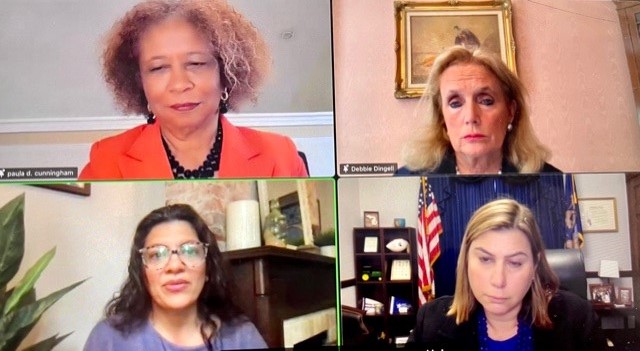AARP Hearing Center

Top elected officials and an audience of 340 took on women's health and financial issues today in a lively and substantive virtual event led by AARP Michigan.
The 90-minute "MI Sisters and Friends: Conversations That Count" featured live appearances by U.S. Reps. Debbie Dingell, Elissa Slotkin and Rashida Tlaib and pre-recorded videos of Gov. Gretchen Whitmer, U.S. Sen. Debbie Stabenow and U.S. Rep. Brenda Lawrence.
The Michigan Chamber of Commerce and the Michigan Bankers Association were collaborators in the event, which also featured comments from health and wealth experts Paula Autry of Henry Ford Health Systems and Pamela Fuertes of Goldman Sachs 10,000 Small Businesses program.
A panel of members of Congress moderated by AARP Michigan State Director Paula Cunningham fielded questions from an engaged virtual audience, most of whom stayed around for the entire conversation.
The event was a follow-up to the Sisters discussion a year ago that yielded this policy agenda for women and minorities:
- Ensure that everyone has access to quality, affordable health care.
- Lower the cost of life-saving medications for diabetes, heart disease and other chronic conditions.
- Make sure seniors have access to safe and affordable long-term care that allows them to “age in place” in their home, instead of a nursing home.
- Protect Social Security from cuts to ensure that our elders can afford to live with dignity.
- Foster development and growth of Black women-owned business, both to create jobs and ensure better access to essential goods and services in underserved communities
- Improve access to government contracts for minority-owned small businesses.
"When women (and minorities) succeed, America succeeds," U.S. Rep. Lawrence said in her video.
Much of the conversation centered around lowering prescription drug prices to make them affordable to all.
"We have a unique opportunity right now to enable Medicare to negotiate prices with drug companies in the Reconciliation (Act)," U.S. Rep. Tlaib said.
U.S. Rep. Dingell said there is also high hopes for movement in Congress on a long term care bill.
"Too many people don't have access to quality long term care," she said, adding that more progress must be made on home and community-based services for older adults.
She noted that women still only earn 82 cents on the dollar compared to men "and that creates a problem for women on pensions."
During a plea to improve health care access, U.S. Rep. Slotkin said there is one county in her district where "you can't deliver a baby. You have to 45 minutes to an hour away."
She called for extending subsidies to the Affordable Care Act to improve affordability and access to more people. Dingell said there's a good chance of that happening in Congress in the next month.
The panelists also said they support expanding Medicare to cover dental, vision and hearing.
Michigan has 1.3 million unpaid family caregivers who need relief. The members of Congress said they back the Credit for Caring Act to help strapped caregivers recoup out-of-pocket costs.
"The three of us have been caregivers," Dingell said. "It's a problem in this country and a priority for all of us."
Tlaib advocated for removing medical debt from credit reports and "there needs to be a better plan" to address a pandemic in nursing homes.
Sen. Stabenow in her recorded remarks stressed lowering the cost of prescription drugs by allowing Medicare to negotiate with drug companies, nursing home reforms and more access to home and community-based services.
In introductory remarks, Gov. Whitmer talked about public school and preschool reforms, infrastructure and housing improvements, and her appreciation for frontline workers during the pandemic.
Denise DeMichele, AARP federal strategy adviser, talked about AARP's federal policy issues. She conducted virtual audience surveys that showed of the issues AARP is advocating for, participants are most concerned about the future of Social Security and Medicare, more home and community-based services options and affordable prescription drugs. About two-thirds said they had used telehealth services.
Fuertes, of Goldman Sachs, said 12 million women-owned businesses contribute about the $3 trillion to the U.S. economy.
Autry of Henry Ford Health said of women leaders, entrepreneurs, mothers, caregivers and others: "We are strong. We are resilient... and we need to take better care of ourselves."
At the conclusion of the conversation, Cunningham implored those in the audience to "now go out and do what you need to do. Advocate. Vote. Volunteer."
The program is available on-demand with this link.































































